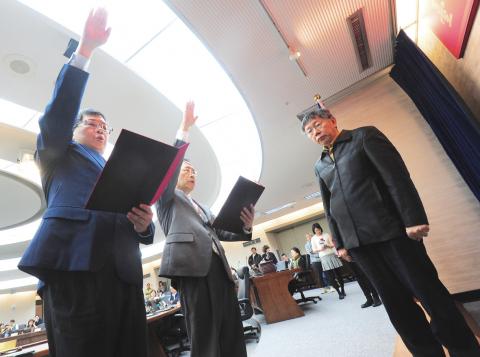Taipei Mayor Ko Wen-je (柯文哲) yesterday administered the oath of office to Tsai Ping-kun (蔡炳坤), who became the third deputy mayor, and Lin Chih-feng (林志?), who was promoted to Taipei Public Works Department commissioner.
Tsai, who became chief executive officer of the Tzu Chi Culture and Communication Foundation in 2016, previously served as principal of Taichung First Senior High School and Taipei Municipal Jianguo High School, and was Taichung deputy mayor under then-Taichung mayor Jason Hu (胡志強) of the Chinese Nationalist Party (KMT) from 2010 to 2015.
The third deputy mayor’s post had been vacant since the start of Ko’s second term on Dec. 25 last year.

Photo: Wang Yi-sung, Taipei Times
Hu’s attendance at the ceremony led to speculation that Ko might cooperate with the KMT or try to attract votes from pan-blue camp supporters if he enters next year’s presidential race.
Asked about the rumors, Tsai said that Hu did not question his political affiliation when he asked him to become Taichung deputy mayor and neither did Ko, adding that since he is not a member of any political party, he could serve everyone.
Ko emphasizes credibility and honesty, efficiency and listening to others, while he believes in love, persistence and efficiency, so he thinks their values match and they could work well together, Tsai said.
While Hu is more humorous, Ko is more rational and straightforward, but Hu’s ample diplomatic experience could help Taipei push its diplomatic efforts and he would be happy to serve as a bridge between Hu and Ko, Tsai said.
He would be supervising the departments of social welfare, education, culture, and information and tourism, among others, and would seek to communicate more with the private sector, Tsai said.
Lin was head of the department’s New Construction Office prior to his promotion.

Several Chinese Nationalist Party (KMT) officials including Chairman Eric Chu (朱立倫) are to be summoned for questioning and then transferred to prosecutors for holding an illegal assembly in Taipei last night, the Taipei Police said today. Chu and two others hosted an illegal assembly and are to be requested to explain their actions, the Taipei City Police Department's Zhongzheng (中正) First Precinct said, referring to a protest held after Huang Lu Chin-ju (黃呂錦茹), KMT Taipei's chapter director, and several other KMT staffers were questioned for alleged signature forgery in recall petitions against Democratic Progressive Party (DPP) legislators. Taipei prosecutors had filed

Taiwan would welcome the return of Honduras as a diplomatic ally if its next president decides to make such a move, Minister of Foreign Affairs Lin Chia-lung (林佳龍) said yesterday. “Of course, we would welcome Honduras if they want to restore diplomatic ties with Taiwan after their elections,” Lin said at a meeting of the legislature’s Foreign Affairs and National Defense Committee, when asked to comment on statements made by two of the three Honduran presidential candidates during the presidential campaign in the Central American country. Taiwan is paying close attention to the region as a whole in the wake of a

NEW WORLD: Taiwan is pursuing innovative approaches to international relations through economics, trade and values-based diplomacy, the foreign minister said Taiwan would implement a “three-chain strategy” that promotes democratic values in response to US tariffs, Minister of Foreign Affairs Lin Chia-lung (林佳龍) said. Taiwan would aim to create a “global democratic value chain,” seek to capitalize on its position within the first island chain and promote a “non-red supply chain,” Lin was quoted as saying in the ministry’s written report to the Legislative Yuan submitted ahead of the legislature’s Foreign Affairs and National Defense Committee meeting slated for today. The Ministry would also uphold a spirit of mutual beneficial collaboration, maintaining close communication and consultations with Washington to show that Taiwan-US cooperation

Taiwan and the US have begun trade negotiations over tariffs imposed by US President Donald Trump earlier this month, Minister of Foreign Affairs Lin Chia-lung (林佳龍) said in an interview this morning before reporting to the Legislative Yuan’s Foreign Affairs and National Defense Committee. The Taipei Economic and Cultural Representative Office (TECRO), Taiwan’s de facto embassy in the US, has already established communication channels with the US Department of State and the US Trade Representative (USTR), and is engaging in intensive consultations, he said. Points of negotiation include tariffs, non-tariff trade barriers and issues related to investment, procurement and export controls, he